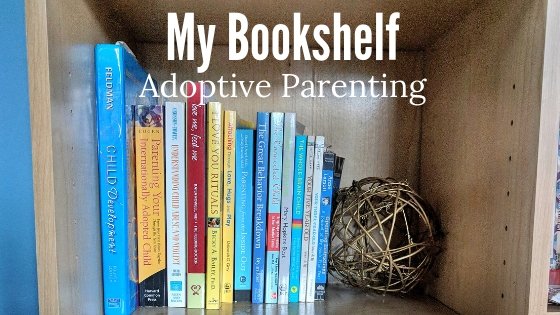My Bookshelf: Adoptive Parenting
While Geoff and I don't have biological children, adoptive parents that do will tell you they've had to relearn how to parent when they adopted or fostered. Children who have experienced trauma often don't respond to traditional parenting techniques like time-outs, star charts or losing privileges. Understanding what children have been through, and how it even alters their brain chemistry, helps adoptive parents better know how to parent them. There are so many out there, but here are some of the ones I've read and my thoughts. Full disclosure, I haven't read all of every one of them, but that's the beauty of them, many are the type where you can read the applicable parts for what you need at that time.
The Connected Child by Karyn Purvis and David Cross
If there is one book I'd say every adoptive or foster parent should read, it's this one. Karyn Purvis created the approach Trust Based Relational Intervention (TBRI), which is widely considered to be the one of the most effective ways to parent a child who comes from trauma. The basic tenets are that a child can't improve in their behavior until they feel safe, and are attaching to you. It's a very easy-to-read book, and explains what happens in an adopted/fostered child's background that cause the need for different methods, and then goes through practical ways to apply those methods.
The Whole Brain Child by Dan Siegel and Tina Bryson
This book is great because it explains the neuroscience behind approaches like TBRI, why they are necessary and why they work, in laymen's terms that are easy to understand. Sometimes TBRI can seem touchy-feely or permissive, but when you understand a traumatized child's actual brain chemistry is different than a typically developing child, it makes sense why they need different parenting approaches. They also give methods to apply this knowledge that are very much in line with TBRI approaches.
The Great Behavior Breakdown by Bryan Post
Post has written a few other books (the main one is Beyond Consequences, Logic and Control, co-written with Heather Forbes), but I got this one initially because I was familiar with the basics of his approach, and this book is divided up into specific behaviors, and talks about the reasons a child is acting out that way, and how you can respond. I have only read the info and first chapter (about the foundation), which is what Post recommends, and then read some pertinent chapters for us (about transitions, bedtime, and defiance) and found them helpful. One of Post's main tenets is that there are only two primary emotions, love or fear, and all other emotions are really based in one of those- I don't really hold to that, but I do believe fear plays a huge role in the difficult behaviors seen in children from trauma, and keeping that in mind helps you parent them more effectively.
Love Me, Feed Me by Katja Rowell, MD
I have very mixed feelings about this book. I think she has some really great approaches to help make mealtime less of a battle, and we've used some of them effectively, but I think she does not give enough weight to food insecurity in adopted/foster children. I know that it's a huge issue for many kids, and I can see some of her methods really hindering attachment because they don't take that food insecurity into account. She does acknowledge it, just not enough, in my opinion. I would only use some of her methods after you have had your child in your care for enough time to see their behaviors and emotions with food, and after they have formed some attachment and are gaining some sense of safety. For children who clearly struggle with significant food insecurity, I would not use some of her methods. That said, some of her approaches have been very helpful for us in making mealtime less of a battle, and getting our daughter to eat a wide range of foods. I'd pick and choose from this book what works for your child.
I Love You Rituals by Becky A Bailey, PhD
We brought this book to India, and I was so glad we did, because when our daughter completely rejected me, it was easy to get ideas of things to try to engage her from this book. This book almost entirely practical, with a huge list of easy games, songs, and playful interactions you can do with your child. When you're in a fog early after being placed with your child, it's very helpful to just be told "sing this song, look your child in the eye, do this with your hands."
Attaching Through Love, Hugs and Play by Deborah D. Gray
This book also has lots of practical ideas of how to help your child attach to you (and you to them), but is much more of a read-through book that explains the reasons and background, as opposed to "I Love You Rituals" which you can just treat like a reference book. This is a good one for before placement, or like me, when you've been home a while and need to circle back to putting attachment at the forefront.
Operating Instructions by Anne Lamott
Ok, so this one isn't and adoption book at all, but it's a book about becoming a parent and not knowing what you're doing at all, and if that isn't adoption I don't know what is. The book is Lamott's journal from her pregnancy and the first year of her son's life, and she is so very relatable. Read it and laugh and cry and feel less alone.
Next to Read:
No Drama Discipline by Dan Siegel and Tina Bryson
Parenting From the Inside Out by Dan Siegel
Parenting Your Internationally Adopted Child by Patty Cogen
Toddler Adoption by Mary Hopkins-Best
Your (Fill in the blank) Year Old by Louise Bates Ames



Comments
Post a Comment